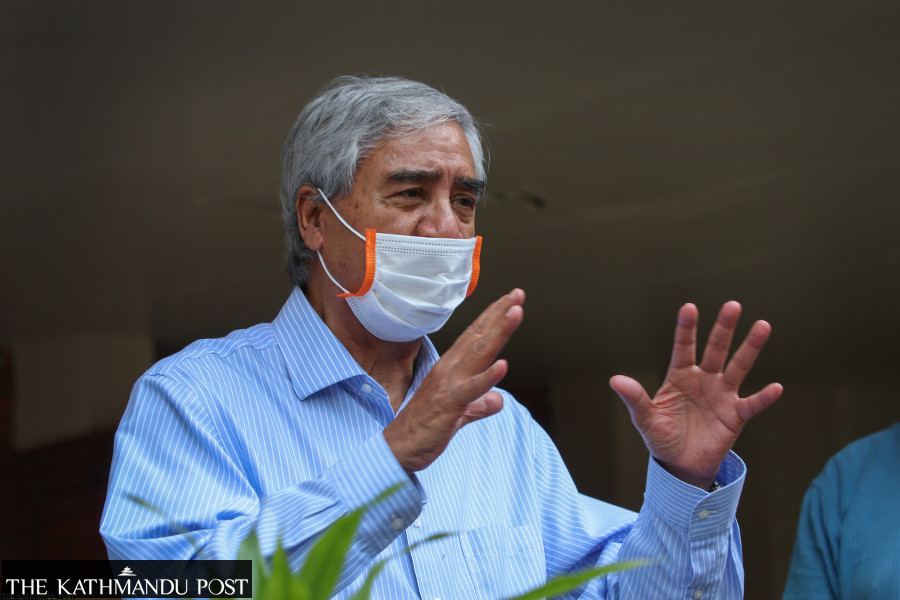National
Experts fault Deuba for prioritising domestic politics over foreign policy
As the MCC’s ratification hangs in the balance, questions arise over the fate of projects under the BRI.
Anil Giri
As major power competition is getting tougher in the region and beyond, Nepal is in a fix, and the Ministry of Foreign Affairs appears to be ineffective.
Narayan Khadka who has been at the helm of the ministry for the last two months has been conspicuous by his silence.
It has been a tradition that a new foriegn minister, after assuming office, holds an interaction with the media and spells out his/her priority. Similarly, a new foreign minister also engages in consultations with experts and holds discussions with diplomatic corps and representatives of the donor community to discuss the government’s priorities.
But Minister Khadka has neither scheduled any meeting with the media nor held meetings with the members of the diplomatic community.
There has not been any communication from the ministry at Khadka’s level with Nepali ambassadors and consul generals in different missions abroad, according to officials.
Foreign policy observers, analysts and diplomats said that issues of foreign policy have taken a back seat and the prime minister should take initiatives.
“It seems that national politics has become the priority of the prime minister. The prime minister and foreign minister must give priority to foreign policy matters,” said former Ramesh Nath Pandey, a former foreign minister. “Regional and international issues are becoming serious by the day.”
According to Pandey, Nepal is already in the strategic radar of India, China and the United States.
“Amid growing geopolitical rivalry with many nations keeping a close eye on Nepal, there is a need for the present government to wake up and devise strategies to deal with the issues,’ said Pandey.
Khadka was appointed foreign minister ahead of the 76th United Nations General Assembly. Until then, Prime Minister Sher Bahadur Deuba himself had been looking after the Foreign Ministry since he took office on July 13.
Khadka during his tour to New York to participate in the UN General Assembly made some controversial remarks on the Millennium Challenge Corporation (MCC) Nepal Compact only to correct after returning to Kathmandu.
Again in Kathmandu, he made a similar kind of contradictory statement on the MCC, which over the last few years has already become a hotly debated issue in Nepal.
In a recent interaction at the Center for Nepal and Asian Studies (CNAS), Minister Khadka once again kicked up the storm by saying Nepal does not have original copies of the 1950 Peace and Friendship Treaty with India and Sugauli Treaty.
The Sugauli Treaty was signed between the government of Nepal and then East- India Company in 1816.
“Our situation is like a house owner not having the ownership certificate of the house,” Khadka had said at the CNAS function.
Observers say a foreign minister’s constant job is working to strengthen the country’s foreign policy and improving ties with friendly nations. But the foreign minister is doing neither and instead making some controversial remarks, according to them.
Amid criticism and concerns from different quarters, the Foreign Ministry is now planning to hold a media interaction and meetings with Kathmandu-based diplomatic corps and others after the 14th general convention of the Nepali Congress which is scheduled for December 10-12 in Kathmandu.
“We are planning to hold interactions with the Kathmandu-based diplomatic corps and media after the party’s 14th general convention,” said a member of Khadka’s private secretariat. “Since preparations are being made for the general convention, the minister has been a bit busy of late.”
On the geopolitical front, according to officials, Nepal is facing tremendous pressure from the United States to ratify the $500 million Millennium Challenge Corporation grant from Parliament.
Two recent back-to-back high-level visits from the United States demonstrated that Washington attaches importance to Nepal.
“Geopolitical rivalry and competition is coming in a big way and we have to maintain vigil,” said Dinesh Bhattarai, who has served as freign policy adviser to two prime ministers.
Bhattarai, also a former ambassador, said it is the Foreign Ministry that should do real-time calculation on various emerging foreign policy issues.
While the MCC’s fate hangs in the balance, questions have arisen over the slow progress of projects under China’s Belt and Road Initiative.
Nepal signed up to both agreements with the US and China in 2017.
Experts say Nepal needs to maintain a fine balance with all its friendly countries including the US and China, even though the latter two are rivals. But to benefit from both projects from the two countries, Nepal must make up its mind and come up with a stance of its own, according to them.
“It seems neighbouring countries want to keep their relations with Nepal like business as usual. Both are quietly and discreetly watching the development inside Nepal. Time has come to reorient Nepal’s foreign policy in a changed context which should be continuity with change,” said Bhattarai.
There are also issues of ambassadorial appointment because still 20 Nepali missions are currently headless.
The government has recently nominated ambassadors to India, the United States and the United Kingdom but several major countries are still without ambassadors.
President of the Association of Former Career Ambassadors of Nepal, Pradyumna Bikram Shah, said that due to the coalition government, the pace of this government including the Foreign Ministry has been slow and that he does not expect much from this government.
“Yes, there are pressing issues like the MCC with America, BRI with China and several pending issues with India. Though the government and the foreign minister seem slow, I can assume that some calculative moves are underway,” said Shah. “A foreign minister can do so much when there is a coalition government with so many parties having interests of their own.”




 16.12°C Kathmandu
16.12°C Kathmandu















